Choosing the best camera for photographing the Milky Way can be overwhelming.
I’ve been testing and comparing different models and, in a nutshell, these are the best digital cameras for Milky Way photography:
1. Sony A7SIII
2. Nikon Z6III
3. Canon EOS R8
4. Sony A7IV
5. Sony A7RV
6. Nikon Z7II
7. Canon EOS R5
8. Nikon Z8
Besides having a good camera, using the best Milky Way camera settings is key to shooting our galaxy. Also, don’t forget that lenses are as important as cameras in night photography, so I highly recommend pairing your camera with one of the best lenses for Milky Way photography.

Having a good camera for Milky Way photography is fundamental.
This winning list of the best cameras for Milky Way only includes Full-Frame cameras since these are the best to photograph the Milky Way with more quality and less digital noise.
However, throughout this article, you’ll find a breakdown of the best cameras to take pictures of the Milky Way according to your budget and preferences. I’ve included APS-C cameras, Micro 4/3, compact cameras, and the best Milky Way camera models on a budget.
Ready to find the best camera for Milky Way?
Note: I didn’t split the article into Mirrorless vs DSLR cameras. Check out our guide on that topic if you still don’t know which system is best for you.
GET THE CALENDAR WITH THE BEST DATES TO PHOTOGRAPH THE MILKY WAY IN 2025
You'll also receive our PDF guide to photographing the Milky Way!
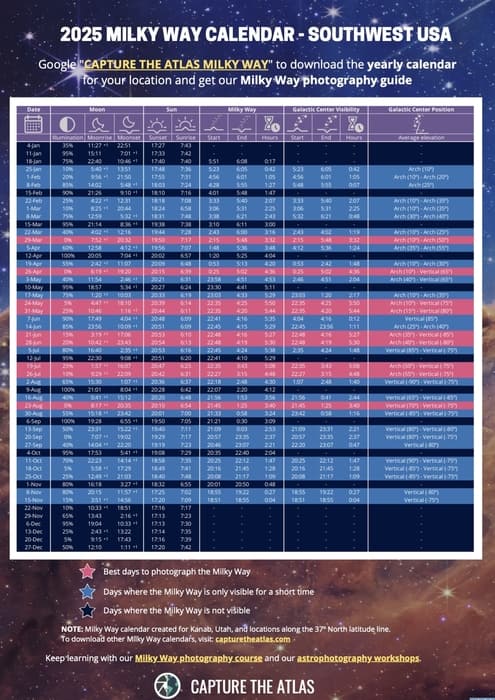
These are the best digital cameras for Milky Way photography:
1. Sony A7S III
2. NIKON Z6III
3. Canon EOS R8
| The Canon EOS R8 is the best Canon camera for Milky Way thanks to its features, as well as its reduced price point. Last year, the R6 held this position; however, the R8 is more affordable without compromising any of the features that make it great for astrophotography. This full-frame camera features a 24 mpx. sensor with great low-light performance and dynamic range. If you are starting your astrophotography journey, this might be one of the best options in the market. The Canon EOS R8 offers some professional features that will take you time to outgrow, but it still manages to keep the menus very clear, which makes this camera very easy to use. |
If you are looking for a camera to astromodify, the Canon EOS R8 is highly recommended by Spencers Camera.
4. SONY A7IV
5. Sony A7RV
| This is one of the best Sony cameras for Milky Way photography. The A7RV is all you need to take high-resolution Milky Way images, and it’s also a superb camera for landscape photography in general. This camera was released in 2022 and it has quickly become one of the best options in its price range. It’s a outstanding camera for night photography, and if you use the right Milky Way settings, you can take otherworldly images of our galaxy. |
If budget is not a problem and you’re looking for a high-end/high res. camera, I’d recommend the Sony A1 instead. It’s my current favorite camera for shooting the Milky Way and Astro in general.
6. Nikon Z7 II
| This is the best high-res. Nikon camera for Milky Way. The huge dynamic range and low-light performance of this model can take your Milky Way images to the next level. This is also a great camera in terms of battery life, weather sealing, and even autofocus in low-light conditions. |
If budget is not an issue, I’d go for the new Nikon Z9 instead, which offers more capabilities while maintaining a high number of Mpx.
7. CANON EOS R5
8. Nikon Z8
Best APS-C cameras for shooting the Milky Way
Any crop-sensor (APS-C) camera can capture the Milky Way, but most of them can’t capture the same quality as full-frame cameras.
These cameras usually struggle in low-light conditions and won’t let you set a high ISO without creating a considerable amount of digital noise in your photographs. They’re usually cheaper and, with a few exceptions, are aimed at beginners and intermediate photographers.
This list shows the best APS-C cameras for Milky Way photography:
- Fujifilm XT-5 (Mirrorless): This is the successor of the highly acclaimed Fujifilm XT-4, and it is every bit as good as the previous model. Based on its price and performance, this camera is aimed at enthusiasts/semi-professionals, and, without a doubt, it’s the best crop sensor camera for shooting the Milky Way. You’ll forget that you’re shooting with an APS-C camera once you see the results in your low-light photographs. Recommended lens: Fujinon XF16mm f/1.4.
- Nikon Z50II (Mirrorless): This is the best APS-C Nikon camera for capturing the Milky Way. Its quality in low-light is on the same level as many basic full-frame cameras. It is a long-overdue update to the previous Z50. Recommended lens: Nikkor Z 20 mm f/1.8
- Sony a6700 (Mirrorless): The Sony a6700 is the flagship Sony crop sensor camera and the best Sony APS-C camera for Milky Way. It stands out for its performance in low-light conditions and its wide array of lenses, paired with a compact body and stunning daytime and video capabilities. A more affordable option is the ZV-E10II; however, this model lacks an EVF, making it less suitable for photography. Suggested lens pairing: Rokinon 12mm f/2.0.
- Canon EOS R50: This is one of the best Canon Astro-cameras for shooting the Milky Way. If you are getting started in photography in general and are looking into Milky Way photography, the Canon EOS R50 won’t disappoint, it offers good quality for an affordable price. Recommended lens: Canon RF 16mm f/2.8.
- Nikon D7500 (DSLR): The D7500 is a good camera for Milky Way photography in the APS-C DSLR range. It’s cheaper, but it can’t beat the low-light performance of the Nikon mirrorless Z50II. Recommended lens: Tokina AT-X 11-20mm f/2.8 AF Pro DX.
Best cheap camera for Milky Way
If you’re looking for the best value for money, these are the best cameras for shooting the Milky Way on a budget:
- Sony Alpha a6100 (Mirrorless): For around $700, you can get a good mirrorless camera for shooting the Milky Way. Together with the Rokinon 12 mm f/2, you’ll have the best cheap camera setup for Milky Way pictures. This entry-level APS-C camera packs many useful features and has a good low-light performance for the price. Recommended lens: Rokinon 12 mm f/2
- Sony A7III (Mirrorless): Even if it was released a few years ago, many consider the Sony A7III to be one of the best digital cameras ever made. It offers professional features at an affordable price. This is one of the cameras we use, and, to me, it’s the best quality-price mirrorless camera for shooting the Milky Way that you can get on a budget. I’ve shot some of my favorite Northern Lights and Milky Way images with this camera, and the results are simply outstanding. Recommended lens: Rokinon 14 mm f/2.8.
If your budget allows it, the new Sony A7IV offers everything the A7III has to offer, but with a newer sensor, improved menu system, and better video capabilities.
- Nikon D750 (DSLR): This is one of the most well-rounded and quality-priced DSLR cameras ever made. Pair it with a lens like the Rokinon 14 mm f/2.8, and for less than $1800, you’ll have an awesome Milky Way camera setup. Recommended lens: Rokinon 14 mm f/2.8
Best Micro 4/3 Cameras for Milky Way
Most photographers agree that Micro four-thirds cameras aren’t the best cameras for Milky Way photography, particularly because of their inferior performance in low-light situations, and, secondly, because they have fewer options for cheap and fast wide-angle lenses.
Nevertheless, some models are noteworthy, and there are two good Micro 4/3 cameras for Milky Way photography:
- OM System OM-1 Mark II (Mirrorless): Micro 4/3 is almost synonymous with OM System (formerly Olympus). This camera is packed with functionalities that makes it one of the best micro 4/3 cameras in the market, and the best OM System camera for Milky Way photography. Recommended lens: M Zuiko 7-14mm f/2.8.
- Panasonic Lumix G9: This is a cheaper option in the micro four-thirds range. The Lumix G9, paired with a fast, good-quality Milky Way lens, can capture nice Milky Way results. The G9 Mark II doesn’t add any significant upgrades in the photography department to justify adding it to this list. Recommended lens: Leica 12mm f/1.4 Summilux.
Best compact camera for Milky Way Photography
Even if you’re a casual photographer, there are great options to get quality Milky Way with compact cameras. For this reason, we had to include the best compact cameras for photographing the Milky Way in this guide.
*Note: Please bear in mind that compact cameras are light and small, but that comes at a price; the built-in lenses usually have a range of 24-70mm and are not the best at capturing light. Even though you can capture nice images, don’t expect the same quality and capabilities as with a standard DSLR/mirrorless camera mounted with a fast lens.
These are the best point and shoot cameras for Milky Way photography:
- Sony rx100 VII: For many reasons, this is the best compact camera to shoot the Milky Way. If you make the most of this camera, you can get even better results than with some entry-level DSLR and mirrorless cameras.
If you’re looking for a cheaper option, the first version of this camera (Sony rx100) could also work as a compact camera for Milky Way (Just don’t expect the same quality results, especially in terms of detail and digital noise).
- Canon PowerShot G7 X Mark II: This Canon point and shoot can also capture great auroras. This camera includes a built-in time-lapse movie mode, which if you pair with a tripod, can create some stunning videos of the Milky Way moving across the sky.
-
- Panasonic Lumix LX100: This is one of the newest compact models from the brand and a good compact camera for shooting the Milky Way.
Basic camera requirements for Milky Way
To help you decide on your next camera for taking pictures of the Milky Way, I want to highlight a few basics that you should look at regardless of the camera model.
These recommendations also apply to shoot other night photography genres like star trails photography
While looking for a good camera to shoot the Milky Way, make sure that it meets the following basic requirements:
- Shooting in manual mode: This is one of the most important requirements in order to adjust the basic settings for Milky Way photography manually, such as the aperture, ISO, and shutter speed.
- Shooting RAW files: Shooting in RAW is key to making the most of your camera and extracting as much detail as possible.
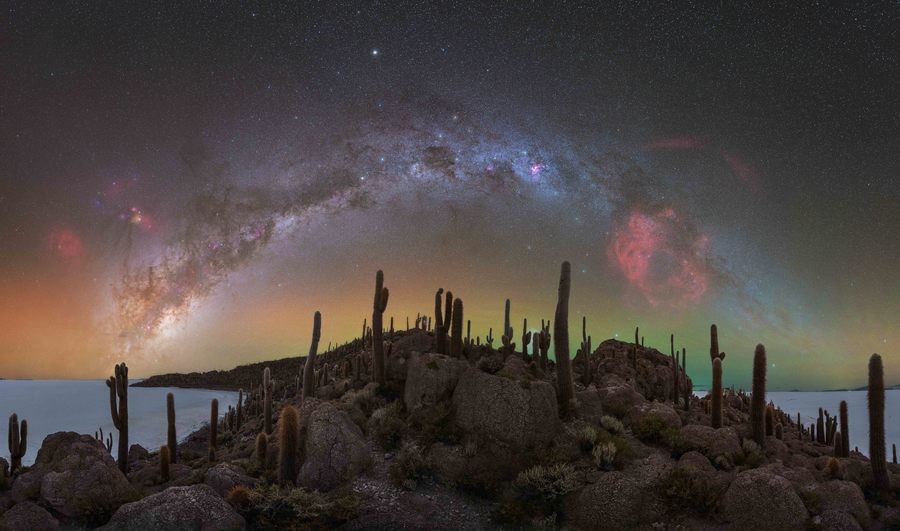
Shooting RAW files in manual mode is key in any camera for Milky Way Photography. Shot with the Sony A7III astromodified.
Nowadays, many smartphone cameras can shoot RAW files in manual mode, but that doesn’t mean that they are quality cameras for Milky Way photography. You can also photograph the Milky Way with a GoPro camera, but don’t expect the same results as with a standard digital camera.
Some other things to consider when buying a digital camera for Milky Way photography are:
- Low megapixel count in the largest possible sensor to capture light more efficiently.
- The battery life is important, especially during long Milky Way nights.
- Focus peaking in mirrorless cameras makes focusing much easier.
- Having the opportunity to charge the camera with an external USB is useful for timelapse.
- Having a fully articulated or tilted LCD screen is very convenient in some types of shoots.
- Low Dual ISO and ISO invariance (useful to preserve highlights in advanced Milky Way shootings). You can see a full updated list of ISO Invariance cameras in our ISO invariance article.
The camera sensor is the most important feature in a Milky Way camera, so I highly recommend you read my guide on the best camera sensor size to see why a big sensor with bigger pixels makes a difference in Milky Way photography!
Conclusion
That’s all! As you can see, shooting with one of the top Milky Way cameras is key for getting the best Milky Way images.
Remember that it doesn’t matter what your budget or skills are; you’ll find a good camera to photograph the Milky Way, and the only thing you need once you have the right camera is to know the best techniques and settings for photographing the Milky Way.
Also, don’t forget that the lens is just as important as the camera you use. You can also check out my guide to the best lenses for Milky Way photography so you can make the most out of your camera.
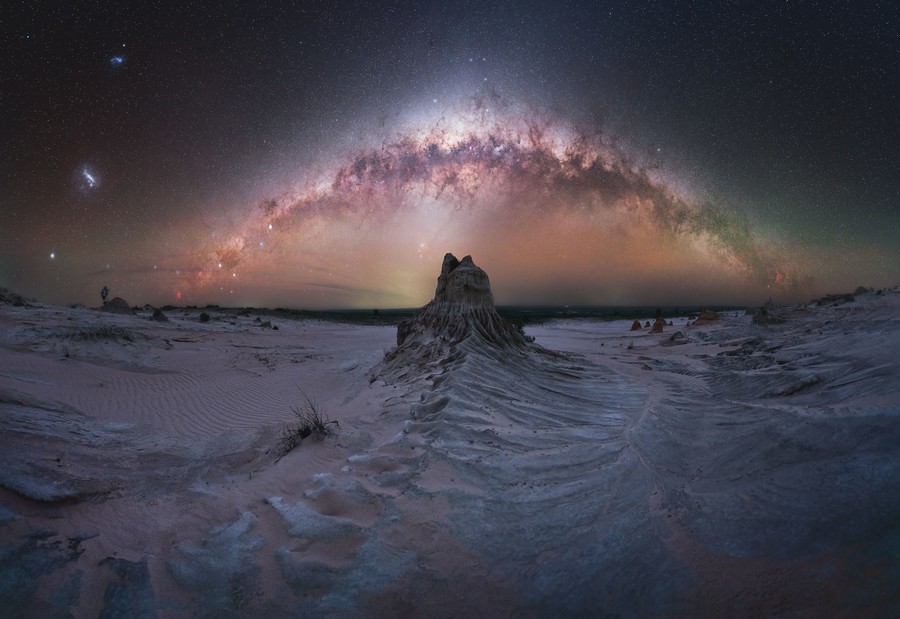
Get a good camera for Milky Way, pair it with a good lens, and you’ll be all set!
My last tip before purchasing any camera for Milky Way is to test it out. These cameras are designed for working in low-light conditions and are usually more expensive, so I always recommend giving them a try first.
I personally like to rent a second camera for taking Milky Way time-lapses and video when I take a night photography trip. I always rent with Lensrentals. They operate in the US., and their rentals are affordable and straightforward. Plus, if you rent your equipment through this link and use the Lensrental promo code CTA15, you will get a 15% discount.
For example, the one-week rental of a Full Frame Sony a7RIV + a wide-angle fast lens like the Sony 24 mm f/1.4 costs $248. If you decide to buy this equipment, it would cost $4.400.
You can also check out other camera and lens rental companies near you.
I hope this guide helps you choose the best Milky Way camera for your needs. If you aren’t sure if you can shoot the Milky Way with your current camera or you’re hesitant about different models, feel free to leave a comment below and I’ll be happy to help! 😉
Happy Captures and Clear Skies!
GET THE CALENDAR WITH THE BEST DATES TO PHOTOGRAPH THE MILKY WAY IN 2025
You'll also receive our PDF guide to photographing the Milky Way!

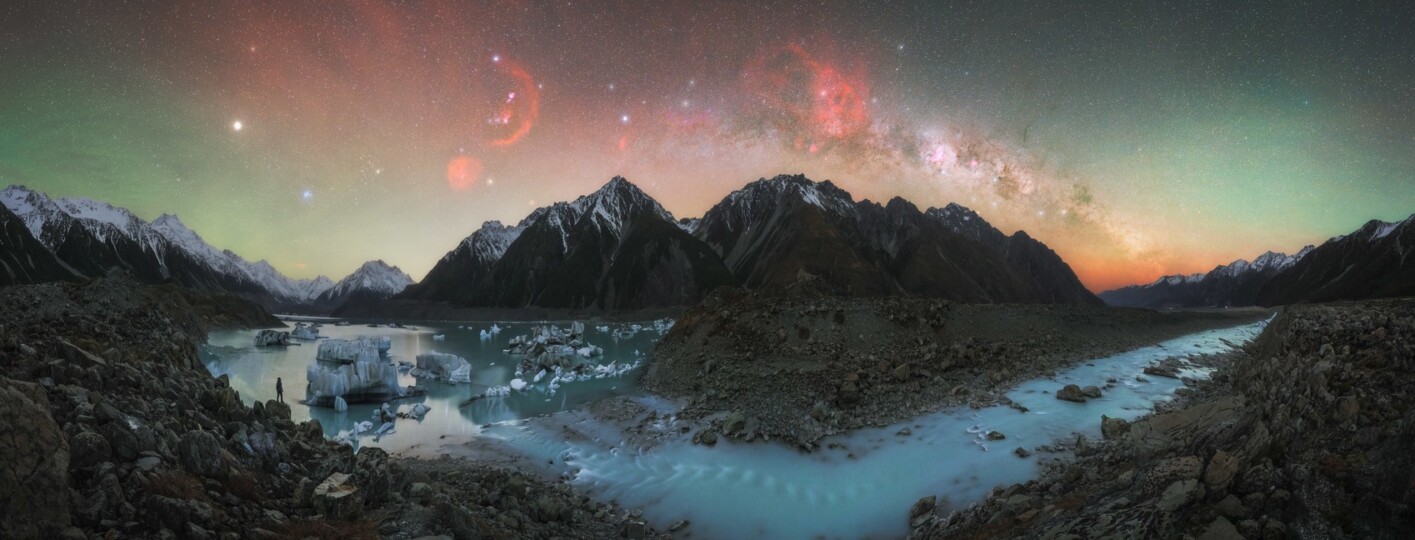
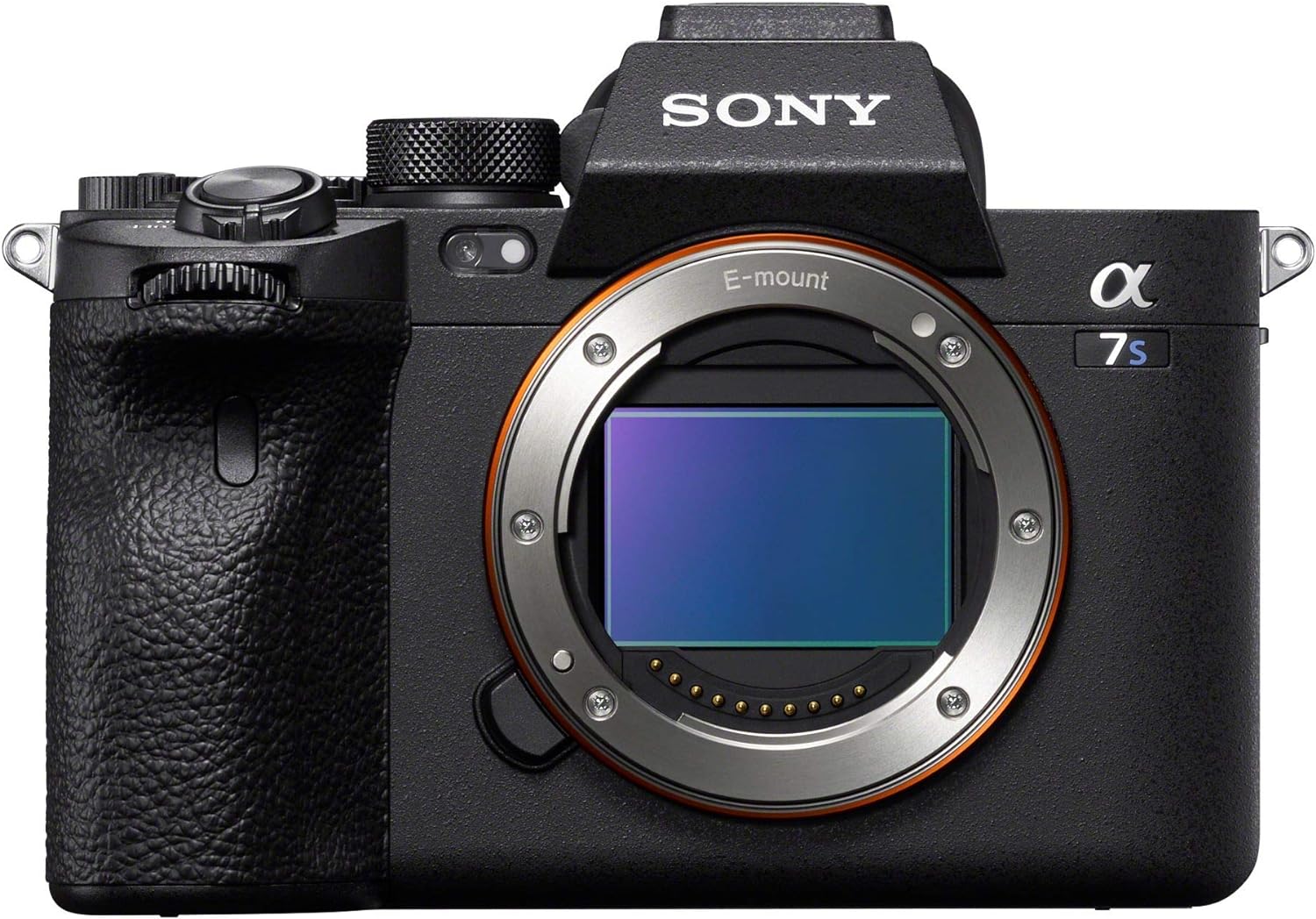






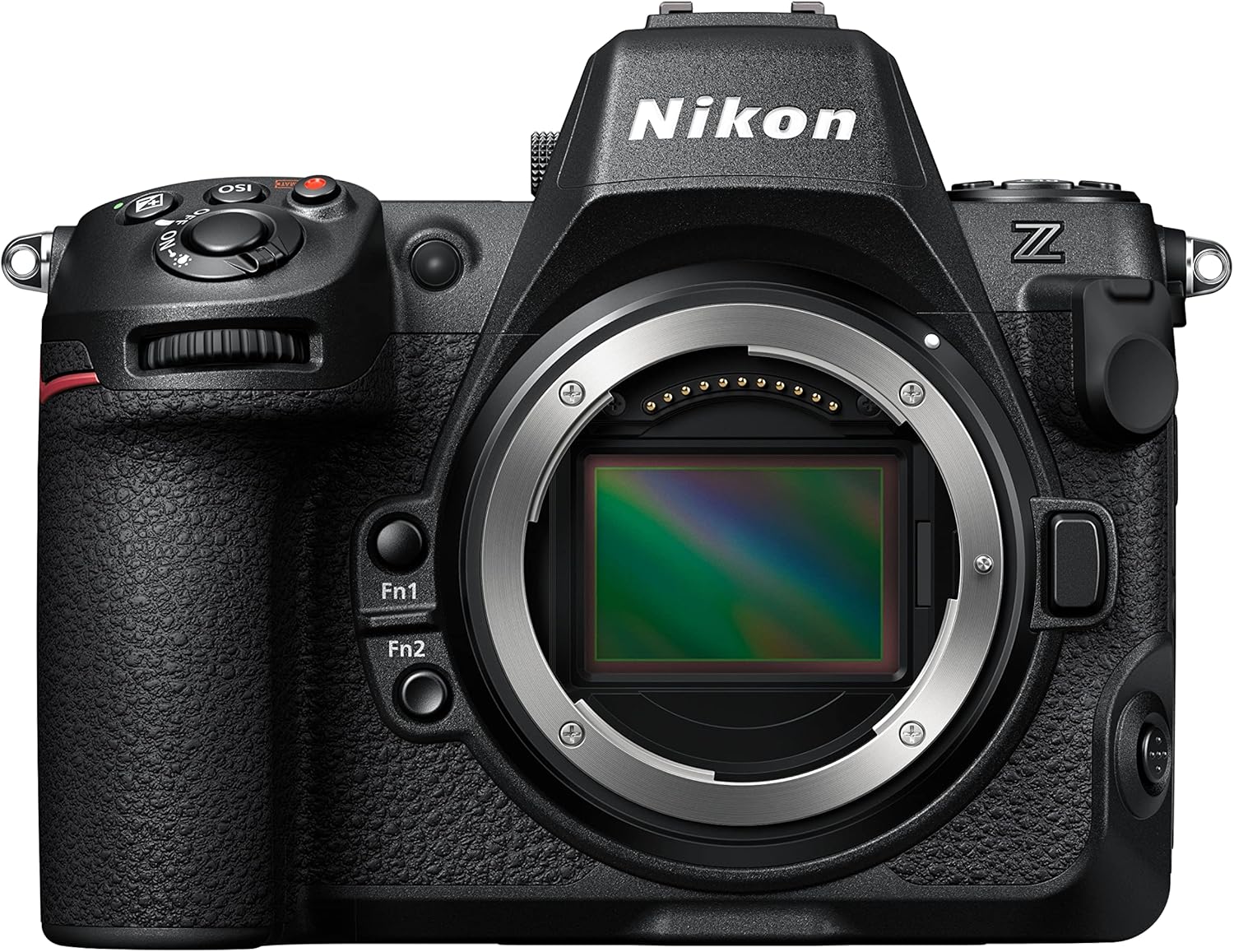




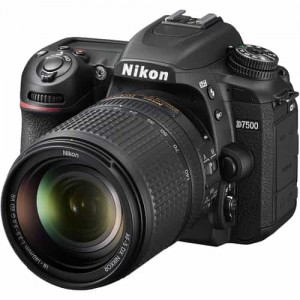


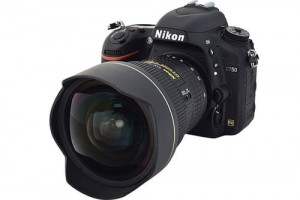

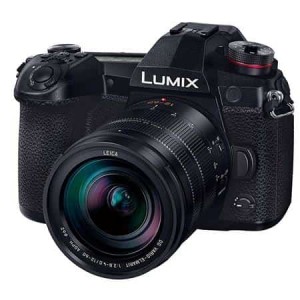
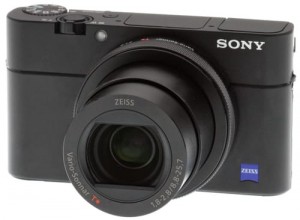



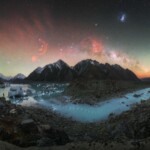
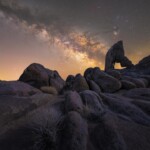
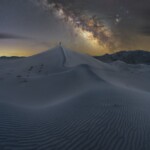

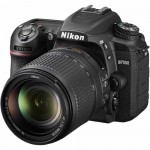
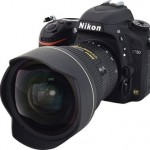
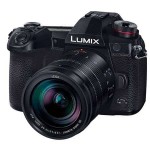
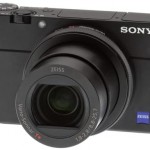
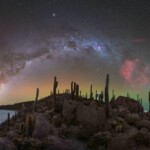
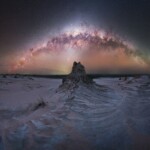
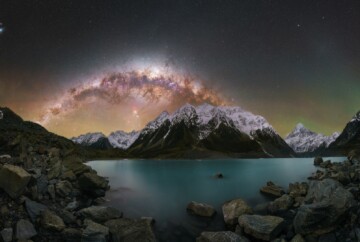
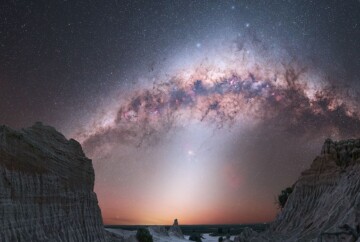
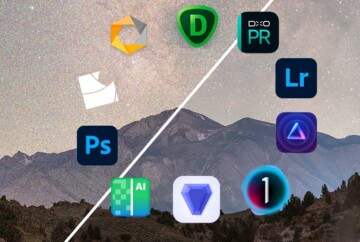
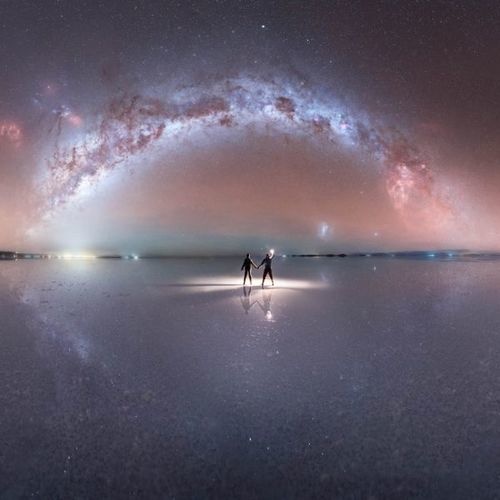
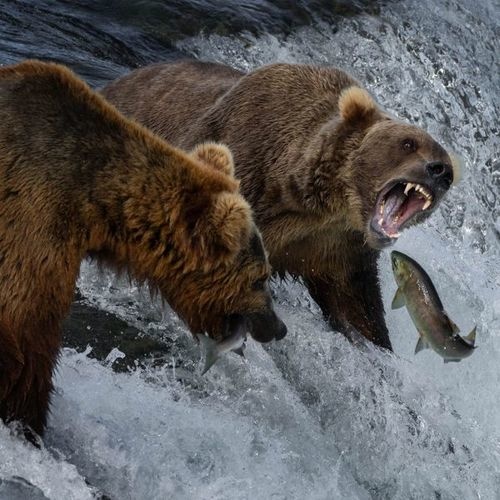
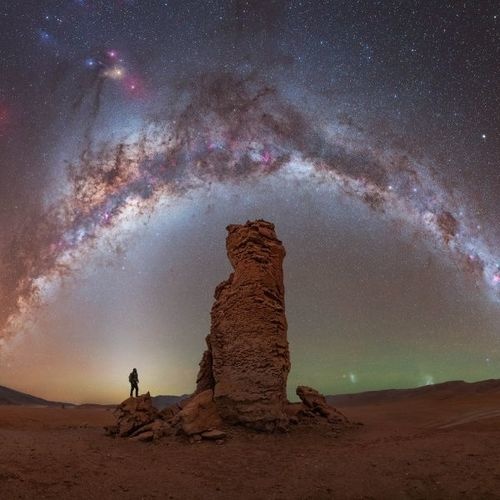
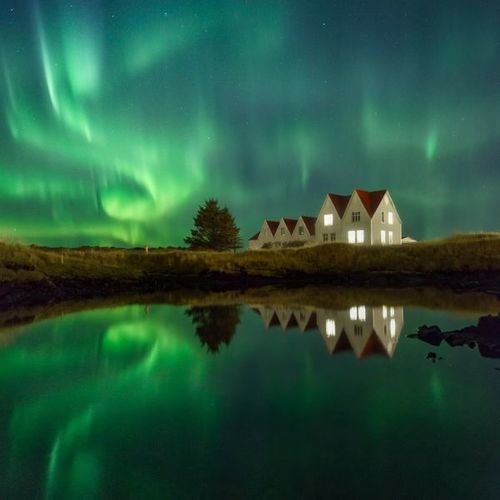
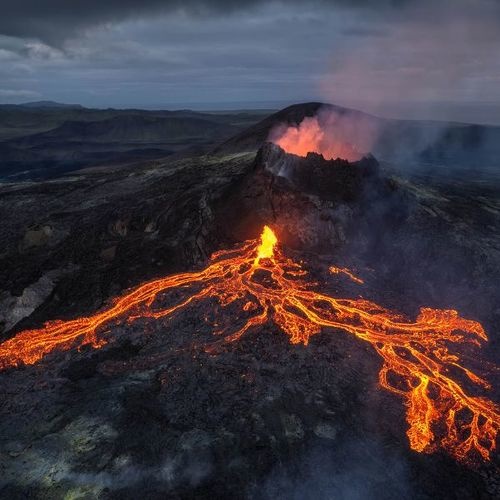
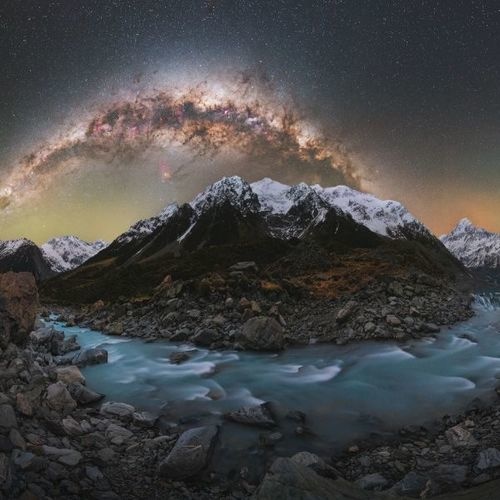

Hey, there is no such thing as hte best cameras to shoot the milky way. Can you tell from the photos I see in the internet that they were taken for xxx camera? Of course not. How about a full frame camera with a low light sensor is good enough? Having a camea and a wide fast lens set up is the beginning of know how and when to shoot the milky way!
You’re right David! Wide fast lens is the best start.
Hi. I have really enjoyed reading your tips for both the Milkyway and the Nothern Lights. I have a Nikon D500 and a Nikon 16-80 mm, F2.8 combo. Would this be sufficient for this type of photography? I might need a heavier travel tripod. I am in my 70s with arthritis in my hands, etc. Suggestions please for this senior lady.
That’s a great setup Carol, and you’ll be able to capture stunning images with that combo. If you are looking for a lighter setup, you might want to look into a mirrorless camera, since the bodies are smaller and lighter and the lenses are generally more compact as well.
As for tripods, I suggest taking a look into the gear Dan and Ascen use for their trips, they own a great travel tripod that works for astrophotography: https://capturetheatlas.com/our-photography-gear/#:~:text=the%20video%20below%3A-,SUNWAYFOTO%20T2840CK,-Sunwayfoto%20T2840CK
All the best!
Nice website, article,
I’m a happy (Dutch) owner of a full-spectrum converted Z6, Concerning noise performance their is one very best camera which is not mentioned in this document and that is the Sigma FP L . I had the luck to compare my Z6 which already is a top performer to someone else Sigma FP L while lapsing the Milky Way in the Pyrenees (France). The Sigma FP L performed even better concerning noise/image quality ! I think for that reason it should be in this list. IMHO at the very top of it.
http://www.astrosurf.com/topic/153304-les-pl%C3%A9iades-et-la-t%C3%AAte-de-cheval-au-sigma-fpau-fait-vous-connaissez-les-fp/
https://www.lonelyspeck.com/tracked-astrophotography-with-the-sigma-fp-l-and-the-move-shoot-move-star-tracker/
https://www.dpreview.com/forums/thread/4635071
Kind Regards Bjorn
Thanks for the suggestion Bjorn! We don’t have experience with the Sigma FP L, but we’ll look into it.
As an Olympus/OM System user, I’m curious why you recommended the EM-1X over the OM-1. Have you personally used either camera, or just saw others use them in your workshops?
Linda,
Both cameras are really good. But yes, you’re right, probably the OM-1 is a better camera since it has higher expanded ISO, better screen resolution and it’s lighter. But the batteries last less.
Best,
Dan
Hello, Dan.
Thank you for all your time and effort in reviewing all the cameras and lenses. I don’t know how you have the time to do all the things you do – tours, gear reviews, articles, and MW course. But, all of us newbies surely do appreciate it. I’ve been reading and rereading your camera recommendations for awhile now; watching YouTube videos, visiting camera store websites, etc. to educate myself. Of all the sources I have sought out, yours is/was by far the most beneficial in finally making my decision to go both full frame, mirrorless, and with which camera – something for MW photography and landscape. Drum roll please… what did she buy… the Sony a7iv. It gives me more megapixels for the landscape application but still highly rated for astro, and a newer model. I didn’t go A7r iv because of the even higher number of megapixels (“mpx noise at high ISO”) along with not needing its video capabilities. I hope to also acquire the Sony 35 mm f/1.4, your recommended best lens paired with this camera sometime in the near future. I spend a lot of time on your website (which is excellent; Ascen does a wonderful job) filling my brain. I enjoy it enormously. Again, thank you for being a great resource.
Linda,
Thank you very much for your nice words! It takes a lot of work to put this together and your feedback is very important for us!
The Sony A7IV is an amazing camera for Milky Way and I have no doubt that you’ll capture spectacular night images with that camera and the right lens.
Looking forward to seeing your images!
Dan
Hi Dan,
I’m fairly new to shooting the Milky Way and currently use a Canon M50 with the Rokinen Series II 14mm F2.8 lens, but want to upgrade. I’m not ready to splurge on the Canon R5. Is there a mid-level Canon that you’d recommend? I’m considering the Canon R or staying with APC with the Canon 90D.
Thanks, Chris
Chris,
I recommend you to try and take the jump into the Canon R series (R8, R5 or R6). You will see a big difference on your pictures and it’s amazing when you get used to them.
Great information! What are your thoughts on Sony a7iii vs Sony a7riii for milky way?. For budget reasons I’m looking at older, used Sony models for my first FF. Is one better for MW? The higher MP interest me for a different imaging purpose thus the interest in the r model.
I’ve tested all Sony models for Astro and, to me, the Sony A7III is the best sony camera for Milky Way photography in 2022, even better than the newer Sony A7IV (higher mpx makes a worse performance at high ISOs).
My current camera is actually a Sony A7III astromodified and I couldn’t be happier! It’s also relatively cheap since the model is a few years old now.
Hope this helps!
Dan
Dan ,
Thank you for the ongoing advice and the purchasable literature which i have found invaluable.
A few years back as a total newbie(am still am) i got the Pentax K1 Mkii mainly for the astrotrace and the weather sealing ( hopefully that translates into dust sealing, for Australia)
Then they discontinued the Sigma Art f1.4 35 mm so i rushed out and got one. A Pentax f2.8 15-30 mm got acquired to do a landscape course.
So am looking to using these is an Astro role back to back, similar , but very different.
Sadly, with all the hardware, theory, and advice, COVID has shackled us from travelling so minimal practical. But in two months retirement beckons and the great Australian outback beckons.
Question, if for example you take a 4 minute Astrotrace, and then a 30 second foreground picture , which Photoshop technique would you use to merge them. I am guessing you would want to get the exposure balanced before the merge.
Again
Many thanks for everything
Andrew
Andrew,
Thanks for your nice words!
In that situation, you’d have to do a blending in Photoshop to merge both images (the tracked sky and the untracked foreground).
This is a relatively easy technique but it’s also where issues are more evident in the post-processing. I have a dedicated series of tutorials to blend night images in my Milky Way course in case you want to check it out.
Best,
Dan
I’d like to save money with a previously owned camera body. Are your prior year selections available? For example the original Sony A7 and A7ii were good when they came out but have been eclipsed by later models.
Yes, here I usually recommend the latest models but some of the previous models are also good for shooting the Milky Way. (Ex. Sony A7RIII instead of Sony A7IV)
Hi Dan,
Thank you very much for sharing your opinion.
I have a Canon 7D, and the night photos have too much noise, and that is way, I am considering to change to a Canon 5D mark IV , R5 or R6, or Nikon D850 or Z7.
According with your article, “the Nikon D850 offers an otherworldly dynamic range, making it, probably the best camera for photographing the Milky Way”.
Can you help me on this ?
Thanks
Hi Eduardo,
Most of the models you mention are great for Milky Way photography.
The Dynamic range of the D850 is superb, but so it is the one of the Z7. Nikon is also releasing new mirrorless cameras so those will be even better.
For Canon a good option is the Canon EOS RA, a specific camera for night photography which can capture a wider gammut of details and colors of the night sky.
As regards Sony, I’d go for a Sony A73 if you’re planning to shoot a lot of night photography.
Hope this helps and please let me know if you have any questions.
Happy shooting,
Dan
Hi Scott,
Canon EOS Rebel xs Canon 18-55 mm f/3.5 max iso 1600 for first ever attempt or rent?
Thanks
Rod
Hi Rod,
In your case, I’d probably rent a faster lens. you can take images of the Milky Way with a Kit lens but it’s much more challenging!
Best,
Dan
Great article!
I’m trying to decide between Sony A7R3 and A7R4. My concern is that the A7R4 has so many pixels that they are smaller and not as efficient as the lower pixeled A7R3. Considering that, do you think A7R4 can produce as good or better night sky images as the A7R3? The cost Difference is not major consideration for me.
Hi Scott,
If night photography is going to be one of the main genres to shoot, I’d go for the A7R3. More than resolution, you need the biggest pixel pitch, and the 7R4 has so many pixels that these are smaller and won’t provide the same performance in low-light. That said, the 7R4 is generally the best camera in the market and perfectly cable of taking stunning night images, so if you’re planning to do general landscape or other genres I’d definitely go for the R4.
Regardless of the model, both are just terrific cameras for Milky Way photography!
Great article!
Just wondering if there is a reason why you do not consider Pentax K1 Mark II on the list
Hi Endika,
Thanks for your message!
There are many great cameras and lenses to photograph the Milky Way that we couldn’t include in the list, mainly because we haven’t tested or because would make the article too long. The Pentax Mark II is a good example, but there are also other brands that could be mentioned like some Leica models.
Happy shooting!
Dan
Wow thanks man. Nice article and informative article.
Thanks Alfredo! Glad to see you found it useful! 😉